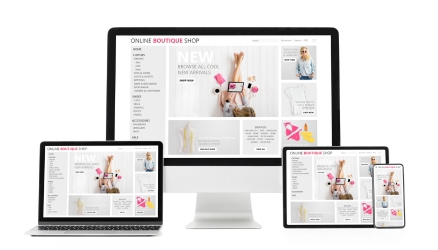Designing Success: Mastering the Latest UX/UI Trends for SEO Dominance
By: Manav Jain
|
Published on: December 13, 2023
1. Embrace Minimalism
Minimalism is a leading trend in UX/UI design. Clean and
clutter-free interfaces not only look aesthetically pleasing but
also improve user engagement. Minimalistic design focuses on
simplifying elements, reducing distractions, and creating a smooth
user journey.
Incorporating minimalism into your design can improve page load
times, which is a crucial SEO ranking factor. Google and other
search engines favor websites with faster loading times, making this
a win-win for both user experience and SEO.
2. Mobile-First Approach
With the growing use of smartphones, a mobile-first approach is
non-negotiable. Designing for mobile devices before considering
desktop layouts ensures that your design is responsive and adaptable
across all screen sizes. This enhances user experience and helps you
rank higher in search results as Google prioritizes mobile-friendly
websites.
3. Human-Centered Design
Human-centered design revolves around understanding your target
audience's needs and preferences. This involves thorough research,
user personas, and user journey mapping. By tailoring your design to
user behavior, you can increase user engagement and dwell time, a
positive signal for SEO.
4. Dark Mode
The dark mode trend is gaining traction across platforms and
applications. This not only reduces eye strain but also conserves
battery life on mobile devices. By offering dark mode as an option,
you can cater to a wider audience, enhancing the user experience.
5.Microinteractions
Microinteractions are subtle animations or feedback elements that
improve user interaction. These may involve button animations,
loading indicators, or confirmation messages. Implementing
microinteractions can make your design more engaging and encourage
users to spend more time on your site.
6. Voice User Interface (VUI)
Voice commands and smart speakers are becoming more common in
households. Integrating VUI into your design can provide an
innovative and user-friendly experience. Ensure your website or app
is optimized for voice search as it's an emerging trend in SEO.
7. Accessibility
Web accessibility is not just a trend; it's a requirement. Ensure
that your design is inclusive for people with disabilities. Features
such as alt text for images, keyboard navigation, and proper heading
structures not only improve UX but also boost SEO by catering to a
broader audience.
8. Gestures and Navigation
Mobile devices have popularized gestures for navigation. Swipes,
pinches, and taps are now a standard part of user interaction.
Integrate intuitive gesture controls to make your design more
user-friendly and responsive.
9. Content-Centered Design
Content remains king in the digital world. Prioritize readability
and legibility by choosing appropriate fonts, text sizes, and
contrast. Well-structured content can keep users engaged and
encourage them to explore your site, improving SEO.
10. Data-Driven Design
Leverage analytics and user feedback to make data-driven design
decisions. Monitoring user behavior, heatmaps, and conversion rates
can help you fine-tune your design for improved user satisfaction
and SEO performance.
Conclusion:
Staying up-to-date with the latest principles is essential for both
user satisfaction and SEO success. Embrace minimalism, adopt a
mobile-first approach, and ensure your design is human-centered.
Implement dark mode, microinteractions, and voice user interfaces.
Prioritize accessibility, gestures, and content-centered design.
Finally, let data guide your design decisions. By incorporating
these trends and principles, you'll create designs that captivate
users and rank well in search results, ensuring your digital
presence is both attractive and discoverable.

































